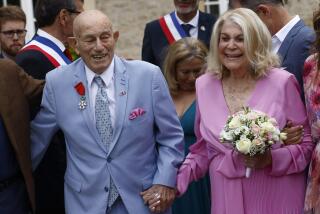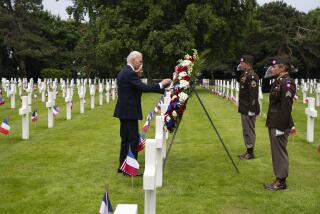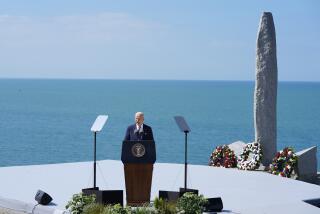Small Town’s Young Men Paid Dearly on D-Day
- Share via
Had the slogging feet of young soldiers faltered in the roiling waters and sinking surf of Normandy Beach the morning of June 6, 1944, there might have been no liberation of Europe.
Had American, British and Canadian fighting men not taken the beachhead and then pushed on to St. Lo and Paris and eventually Berlin itself, there would have been no Allied victory.
Even Supreme Allied Commander Gen. Dwight D. Eisenhower knew all too well the risks that dawn would bring. Hidden deep inside the pocket of his Army jacket was a short note he had written taking full blame should the invasion of German-occupied France be thrown back into the English Channel.
There the note remained; instead, he issued this statement to a stunned world: “The tide has turned! . . . The free men of the world are marching together to Victory!”
Before a year’s time the war in Europe was won. But at a terrible cost on D-day.
No one sacrificed more that day than the boys from Bedford, Va. Twenty-one young men from the small town in the Blue Ridge Mountains were killed on D-day; two more lost their lives as the Normandy campaign slogged onward. Only two later made it home to Bedford to tell of that awful morning.
No other town in American history has given such a high percentage of its young in battle.
But the grief was multiplied all over America.
More than 10,000 Allied soldiers were killed, wounded, missing or captured before the sun rose over Normandy the next morning. More than two-thirds were from the United States.
Over their bodies, lying face down in the sand and bobbing in the water, came 140,000 of their war buddies. From the air behind enemy lines, paratroopers dropped into the hedgerows to cut off any German reinforcements. At sea, a 5,000-member naval armada--battleships and landing craft--pounded away at the bluffs.
For those on the sand in the first minutes, it amounted to downright slaughter. Many never even made it out of their Higgins landing crafts.
Roy Stevens, one of the Bedford boys, survived his ride in a landing boat headed to the beach, but lost his twin brother, Ray, in another.
“I was so sure that I’d get to shake his hand in France,” Roy recalls now. “But it just didn’t work out that way.”
Those who made it to the safety of the beach wall, and a moment’s respite from the German fire above, were amazed to find themselves still alive. They hurriedly tore off their bullet-riddled jackets and continued the onslaught.
As dreadful news spread to communities throughout the country, victory came to be a painful gift.
A hush descended on America. Sporting events were canceled. The New York Stock Exchange paused for a moment of prayer. Church bells tolled, and in Philadelphia, the mayor lightly tapped the Liberty Bell, not heard from in more than a century.
In Reno, Nev., the roulette wheels slowed to a halt and the casinos closed, all in deference to those a world away spinning toward immortality.
The Bedford telegraph operator received the first message from nearby Roanoke: “We’ve got casualties.” And then the names came tumbling across the wire.
Earl Parker, a new father, never made it home to see his baby daughter. Leslie Abbott. Frank Draper. Taylor Fellers.
On and on, seemingly without end. Farm boys and town boys, husbands and fiances. One kid worked for the state highway commission, another was close to winning a spot on a professional baseball team, another wrote poetry.
It fell to the old men in town to deliver the telegrams. They drove across the low hills and past the fields rich in hardwoods and summer flowers. They stopped twice at the Hoback farm. That family lost two sons.
D-day has become as hallowed in American memory as Gettysburg, as revered as Yorktown.
The soldiers from Bedford who hit Omaha--Company A, 116th Regiment, 29th Division--had been warned there would be no turning back. The Germans, their colonel told them, would fight for keeps.
“The Hun doesn’t like Yankee drive and guts,” Col. Charles D.W. Canham told his troops. “Show him that you have plenty. If you close with him, use your bayonet, show him you can take it and dish it out. . . .
“Be prepared to fight for your life, to meet the worst, and make up your minds now that you are going forward regardless. It is a one-way ticket. We are not giving ground at any time and not leaving until the job is done.”
Many never left.
And in the Bedford cemetery, tombstone after tombstone is etched with this date: June 6, 1944.
More to Read
Sign up for Essential California
The most important California stories and recommendations in your inbox every morning.
You may occasionally receive promotional content from the Los Angeles Times.











